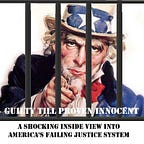How Long can a Fugitive Evade the FBI?
By: Jake Martin 23 December 2020, 14:09 — Citywire | News, views and analysis for professional fund buyers (citywireusa.com)
Lawrence Hartman, mentioned below, is the author of GUILTY TILL PROVEN INNOCENT: A Shocking Inside View Into America’s Failing Justice System (now available online at Amazon) and may be contacted by email at Lawrence@ComplianceMitigation.com to discuss you or your company’s legal mitigation needs.
One ex-fugitive recommends that the accused advisor lawyer up, turn himself in, and do his best to cooperate with authorities.
It’s been three months since advisor and radio show host Chris Burns, under increasing scrutiny by investigators from the Securities and Exchange Commission (SEC), went missing from his Berkeley Lake, Georgia home.
Burns, the 38-year-old founder of Atlanta-based Dynamic Money, has not been seen since September 24. His wife, Meredith Burns, now a relief defendant in the SEC’s case against Chris Burns and his various entities, reported him missing the next day, when he was supposed to provide the agency with documents related to his businesses.
Accused of defrauding clients of millions of dollars and, as of October 23, wanted by the Federal Bureau of Investigation (FBI) on a mail fraud charge, Burns has so far evaded capture.
There may not be dozens of people in FBI windbreakers combing the woods with dogs to try to pick up the scent of the fugitive advisor, but that doesn’t mean the search isn’t on.
The FBI is basically waiting for Burns to make a mistake, said Walt Pavlo, president of 500 Pearl Street, a consulting firm for attorneys and their clients in federal criminal cases. His guess is that it won’t take long, especially given Burns’ last-minute cash-grab and transfer of assets before making his run.
‘The FBI has tracked thousands of people who have tried running from justice — and this is this guy’s first attempt,’ Pavlo said. ‘There’s no manhunt on for this guy. They’ve laid out the big net, and he’s just going to walk into it somewhere.’
Pavlo said the FBI is looking for financial transactions that might give away Burns’ location and, in the meantime, are getting his name and information up on all the law enforcement databases — in the US and internationally. He said the FBI is also monitoring the people closest to him and putting pressure on them to contact the authorities should they hear from Burns.
‘Who he routinely calls or tries to contact is stuff the FBI has all the information on, and they’re no doubt reaching out to those people,’ Pavlo said, adding that eventually Burns is going to reach out to someone who would rather not aid and abet a fugitive.
Pavlo himself became involved in an embezzlement scheme while working as a senior manager at MCI Telecommunications (later known as WorldCom) and, in 2001, pleaded guilty to wire fraud, money laundering and obstruction of justice. He served two years in a federal prison and is now a Forbes contributor.
‘It’s not like this guy’s looking at a life sentence or anything,’ Pavlo said of Burns. ‘If you made a mistake and you got afraid, just come back and face the music and things will be a lot easier on you. Being a fugitive from justice is a pretty tough game.’
‘Tomorrow’s not gonna get any better than today,’ he added.
Sharing those sentiments was former white-collar fugitive Larry Hartman, a US lawyer who evaded capture for about five years, before eventually being arrested on immigration charges in Nicaragua and extradited to the US to face fraud and money laundering charges. Hartman ultimately served about seven and a half years of a 10-year sentence.
‘My sentence would have been less if I had come in and cooperated straight from the start and I have certain regrets about that — I wish I had done that,’ Hartman said. ‘If I could speak to this Chris Burns guy, I’d tell him to lawyer up, turn himself in and see how he can cooperate in an effort to mitigate the consequences that he’s looking at.’
Hartman said his life on the run was largely motivated by fear and desperation about not wanting to face the consequences for his actions. He said he was unable to think clearly about the stakes, for himself and his family, and what his best options really were.
‘Incarceration was brutal, don’t get me wrong, but day to day, it’s not a horrible experience,’ Hartman said. ‘The fear of the experience is infinitely worse than the actual reality, which still completely sucks. What your family goes through is a lot worse than what you end up going through. Him being on the run prolongs that aspect of it for his family.’
Those with knowledge of Chris Burns’ whereabouts are encouraged to contact the FBI.
